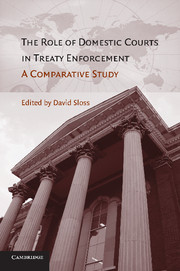Book contents
- Frontmatter
- Contents
- Contributors
- Preface
- Acknowledgments
- 1 Treaty Enforcement in Domestic Courts: A Comparative Analysis
- 2 Does International Law Obligate States to Open Their National Courts to Persons for the Invocation of Treaty Norms That Protect or Benefit Persons?
- 3 Australia
- 4 Canada
- 5 Germany
- 6 India
- 7 Israel
- 8 The Netherlands
- 9 Poland
- 10 Russian Federation
- 11 South Africa
- 12 United Kingdom
- 13 United States
- 14 The Role of Domestic Courts in Treaty Enforcement: Summary and Conclusions
- Index
- References
5 - Germany
Published online by Cambridge University Press: 06 January 2010
- Frontmatter
- Contents
- Contributors
- Preface
- Acknowledgments
- 1 Treaty Enforcement in Domestic Courts: A Comparative Analysis
- 2 Does International Law Obligate States to Open Their National Courts to Persons for the Invocation of Treaty Norms That Protect or Benefit Persons?
- 3 Australia
- 4 Canada
- 5 Germany
- 6 India
- 7 Israel
- 8 The Netherlands
- 9 Poland
- 10 Russian Federation
- 11 South Africa
- 12 United Kingdom
- 13 United States
- 14 The Role of Domestic Courts in Treaty Enforcement: Summary and Conclusions
- Index
- References
Summary
INTRODUCTION: INTERNATIONAL TREATIES AND GERMAN PRACTICE
After the traumatic experience of German self-isolation from the democratic world in the Nazi era and World War II, the founders of the new (West) German Constitution, the Grundgesetz, regarded integration into the world community as a primary goal, perhaps the primary goal, for the establishment of a democratic and federal Germany. Accordingly, the Grundgesetz became famous for its “friendliness” toward international legal relations.
Under the prevailing interpretation of Article 59 of the Grundgesetz, duly ratified treaties are part of German law and enjoy the same status as federal statutes, similar to the Supremacy Clause of the U.S. Constitution. Under the prevailing canons of interpretation, however, this is only part of the story: German courts are also bound to interpret domestic law, as far as possible, in a way that avoids the breach of international legal obligations. Cases of open and intentional conflict between an international treaty and domestic legislation are extremely rare. Thus, the role of German courts in the domestic implementation of international treaties appears to be considerable but straightforward: their task is to allow Germany to fulfill its international obligations by faithfully interpreting German law in accordance with Germany's international obligations, in particular treaty obligations.
If it was ever so simple, this is no longer true. As a member of the United Nations and the European Union, Germany has become a state party to a great number of international treaties so that potential conflicts become increasingly frequent.
- Type
- Chapter
- Information
- The Role of Domestic Courts in Treaty EnforcementA Comparative Study, pp. 209 - 242Publisher: Cambridge University PressPrint publication year: 2009
References
- 2
- Cited by



